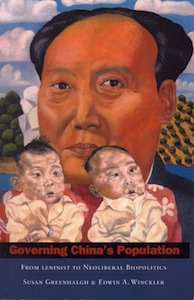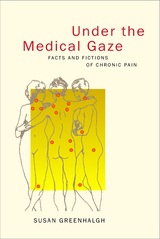Professional Bio
The central concern of Professor Greenhalgh’s recent work has been to understand Chinese projects of modernity/globality – state efforts to transform China’s “backward masses” into the modern workers and citizens needed to make China a prosperous, globally prominent nation – and their effects on China’s society, culture, politics, and global standing. Her empirical focus has been the state’s project to optimize the size and “quality” of China’s population by limiting all couples to one child. Aside from the basic policy of economic reform and opening up, no policy has been more consequential to reform-era China than the one-child policy.
 Her interests in the social dimensions of China’s global rise are reflected in three recent books. China’s one-child policy is one of the most troubling social policies of modern times. Despite its pervasive, mostly pernicious effects, no one has systematically examined how it came into being. Just One Child: Science and Policy in Deng’s China(California, 2008) addresses that crucial question. Building on the insights of science and governmentality studies, this book develops an epistemic, or knowledge-centered, approach to policymaking within and beyond the state.
Her interests in the social dimensions of China’s global rise are reflected in three recent books. China’s one-child policy is one of the most troubling social policies of modern times. Despite its pervasive, mostly pernicious effects, no one has systematically examined how it came into being. Just One Child: Science and Policy in Deng’s China(California, 2008) addresses that crucial question. Building on the insights of science and governmentality studies, this book develops an epistemic, or knowledge-centered, approach to policymaking within and beyond the state.
Just One Child is a science studies project on the role of Chinese defense science and Marxian social science in the making of the one-child policy and, in turn, of Chinese modernity. Focusing on the historic period 1978-80, when China was just re-entering the global capitalist system after decades of self-imposed isolation, it documents the extraordinary process by which a handful of leading missile cyberneticists hijacked the population policymaking process to create a policy that treated people like missiles. The book places these science- and policy-making practices in the broader contexts of the scientization and statisticalization of sociopolitical life, showing how certain quantification practices, calculative techniques, and visual inscriptions created a story of the Chinese nation facing a crisis of modernization so serious that only a policy of one child for all could avert it. This new scientific mode of policymaking produced not only a notorious social policy, it yielded a new form of scientific reason within the regime and gave birth to a technoscientific state. Beyond the origins and broad effects of the one-child policy, the book poses larger questions of interest beyond China: What culture is science? What counts as politics now, after the political ascent of science and technology? What constitutes the political abuse of science and why does it matter? What gives population its vital significance as a field of politics today?
Just One Child has received favorable reviews in over a dozen publications, including Nature, Science, and theTimes Literary Supplement. It received the 2010 Joseph Levenson Prize of the Association for Asian Studies for the book that makes the greatest contribution to the understanding of post-1900 China, as well as the 2010 Rachel Carson Book Prize of the Society for the Social Study of Science (the “4S”) for the best book in science studies with social or political relevance. Just One Child was given honorable mention in two anthropology book competitions: for the 2010 Senior Book Prize of the American Ethnological Society and for the 2009 Gregory Bateson Prize of the Society for Cultural Anthropology.
 Despite all the controversy surrounding China’s population control projects, they remain deeply misunderstood. Governing China’s Population: From Leninist to Neoliberal Biopolitics (Stanford, 2005, co-authored with political scientist Edwin A. Winckler) examines how China has governed its population during the 50-plus years since the Communist revolution of 1949, and with what effects. This book traces the “governmentalization” of China’s population – a remarkable build-up since around 1980 of capacity for governance by the regime, the professions, and individuals – and the attending rise of a vast new field of “biopolitics” or “vital politics” involving power over the production and cultivation of human life itself.
Despite all the controversy surrounding China’s population control projects, they remain deeply misunderstood. Governing China’s Population: From Leninist to Neoliberal Biopolitics (Stanford, 2005, co-authored with political scientist Edwin A. Winckler) examines how China has governed its population during the 50-plus years since the Communist revolution of 1949, and with what effects. This book traces the “governmentalization” of China’s population – a remarkable build-up since around 1980 of capacity for governance by the regime, the professions, and individuals – and the attending rise of a vast new field of “biopolitics” or “vital politics” involving power over the production and cultivation of human life itself.
Governing documents how the state’s concern to reduce the “quantity” of China’s people (via the one-child policy) intersected with concerns to enhance their bodily and mental “quality” (by quasi-eugenic means) to stimulate the development of a gigantic apparatus of population surveillance, management, and control unparalleled in the world. It also traces a gradual, still ongoing shift in governance from state to market or, in our terms, from “Leninist biopolitics,” based on direct coercive controls, to an increasingly “neoliberal biopolitics” that uses indirect state regulation and devolves governing functions to local society, that has accompanied China’s rapid entry into global markets. Stressing the productivity of the population project, this study shows how the governmentalization of population not only restratified Chinese society, inducing social suffering on a staggering scale; it also created new kinds of Chinese persons (“the good mother,” “the quality single child”), strengthened the Chinese party-state, and reestablished China’s global position in complex and contradictory ways.
 In 2008 Professor Greenhalgh was invited to deliver the Reischauer Lectures at Harvard’s Fairbank Center for Chinese Studies. In those lectures, she traced the connections between the state’s massive project to govern its population and cultivate its society, and the nation’s rise to global power. Focusing on the decade since 2000, she argued that, far from mere population control, in the 21st century the governance of population has evolved into a much broader project of social or even human governance. The governing of China’s society has been a major site for the adoption of new, more indirect, “human-centered” techniques of governance. Like the neoliberal methods of “good governance” used elsewhere, such techniques work in part by promoting more entrepreneurial, self-directed private selves. By helping transform China’s rural masses into modern workers and citizens, by working to strengthen, techno-scientize, and legitimize the party-state, and by boosting what Chinese intellectuals call China’s “comprehensive national power,” the governance of the population has been vitally important to the rise of global China. The lectures were extensively revised and published in 2010 by Harvard University Press under the title Cultivating Global Citizens: Population in the Rise of China.
In 2008 Professor Greenhalgh was invited to deliver the Reischauer Lectures at Harvard’s Fairbank Center for Chinese Studies. In those lectures, she traced the connections between the state’s massive project to govern its population and cultivate its society, and the nation’s rise to global power. Focusing on the decade since 2000, she argued that, far from mere population control, in the 21st century the governance of population has evolved into a much broader project of social or even human governance. The governing of China’s society has been a major site for the adoption of new, more indirect, “human-centered” techniques of governance. Like the neoliberal methods of “good governance” used elsewhere, such techniques work in part by promoting more entrepreneurial, self-directed private selves. By helping transform China’s rural masses into modern workers and citizens, by working to strengthen, techno-scientize, and legitimize the party-state, and by boosting what Chinese intellectuals call China’s “comprehensive national power,” the governance of the population has been vitally important to the rise of global China. The lectures were extensively revised and published in 2010 by Harvard University Press under the title Cultivating Global Citizens: Population in the Rise of China.
China’s one-child policy helped avert a population crisis, but it has created two social crises so severe that, according to knowledgeable observers, they threaten to slow if not derail the nation’s global ascent. One crisis stems from the rapid aging of the population in a context largely lacking public forms of social security. The other arises from a growing gender gap among the young. Professor Greenhalgh’s current research focuses on the sex ratio question and its implications for China’s domestic and international security. Demographic projections suggest that within two decades as many as 15 percent of Chinese men, mostly poor, rural, and ill-educated, will not be able to marry. Both academic research and official state discourse depict these men as potentially violent menaces to social order and political stability who will foment crime and violence at home, while making China more bellicose on the world stage.
Professor Greenhalgh’s project examines these questions through ethnographic research in three parts of the country. It asks, first, what strategies are poor rural men using in their efforts to secure brides? Are they importing brides from neighboring countries, kidnapping and purchasing brides from elsewhere in the country, or forming unorthodox forms of union? Second, how are men unable to achieve manhood in conventional ways negotiating their identities so as to become “good men”? Are they turning to a repertoire of more militant behaviors to assert a new, positive form of malehood? More generally, what is the potential for violence in the Chinese countryside? Third, what are the social, cultural, and political consequences of the shortage of brides for men, their families, and communities? And finally, what are the larger implications for China’s security and international relations?
 An earlier book, Under the Medical Gaze: Facts and Fictions of Chronic Pain, examined power over life and the body at the microlevel of the doctor-patient encounter in American biomedicine. The Medical Gaze is an auto-ethnography of a life-threatening medical experience in which a pain specialist, through creative interpretation of the diagnostic criteria for a newly emerging chronic disease, convinced himself and his patient (the author) that she had a painful, untreatable, lifelong muscle condition called fibromyalgia. The book traces the ruinous effects of this diagnosis and related treatments on the patient’s inner world, bodily health, and overall well-being. Drawing together the insights of medical anthropology, science and technology studies, and feminist work on the self and emotion, the book illuminates medicine’s power to create and inflict suffering, to define disease and the self, and to manage relationships and lives. It argues that the biomedicalization of pain too often silences the ill and diminishes the person in the painful body, and that individual and communal storytelling – especially by the ill themselves — is a promising strategy for changing the culture and politics of pain.
An earlier book, Under the Medical Gaze: Facts and Fictions of Chronic Pain, examined power over life and the body at the microlevel of the doctor-patient encounter in American biomedicine. The Medical Gaze is an auto-ethnography of a life-threatening medical experience in which a pain specialist, through creative interpretation of the diagnostic criteria for a newly emerging chronic disease, convinced himself and his patient (the author) that she had a painful, untreatable, lifelong muscle condition called fibromyalgia. The book traces the ruinous effects of this diagnosis and related treatments on the patient’s inner world, bodily health, and overall well-being. Drawing together the insights of medical anthropology, science and technology studies, and feminist work on the self and emotion, the book illuminates medicine’s power to create and inflict suffering, to define disease and the self, and to manage relationships and lives. It argues that the biomedicalization of pain too often silences the ill and diminishes the person in the painful body, and that individual and communal storytelling – especially by the ill themselves — is a promising strategy for changing the culture and politics of pain.
Professor Greenhalgh’s work has been recognized by several awards and numerous fellowships and research grants. In 2002 she received the Clifford C. Clogg award (from the Population Association of America) for outstanding career achievement in population studies during the first twenty years post-Ph.D. This is the first time that award has gone to an anthropologist. A recent article (“Missile Science, Population Science”) was named runner-up for the Gordon White Prize for the most original article in contemporary Chinese studies published in 2005. Her work has also been recognized by major research grants from the National Science Foundation and National Institutes of Health, an Individual Project Fellowship from the Open Society Institute, and a Distinguished Visitorship at the John T. and Catherine D. MacArthur Foundation in Chicago. In 2007 she was invited to deliver opening-night speeches to the Launch Conference for the new British Inter-University China Center (BICC) (London, June), and the Berlin Roundtable on Transnationality: Population Politics and Human Rights (Berlin, February).
